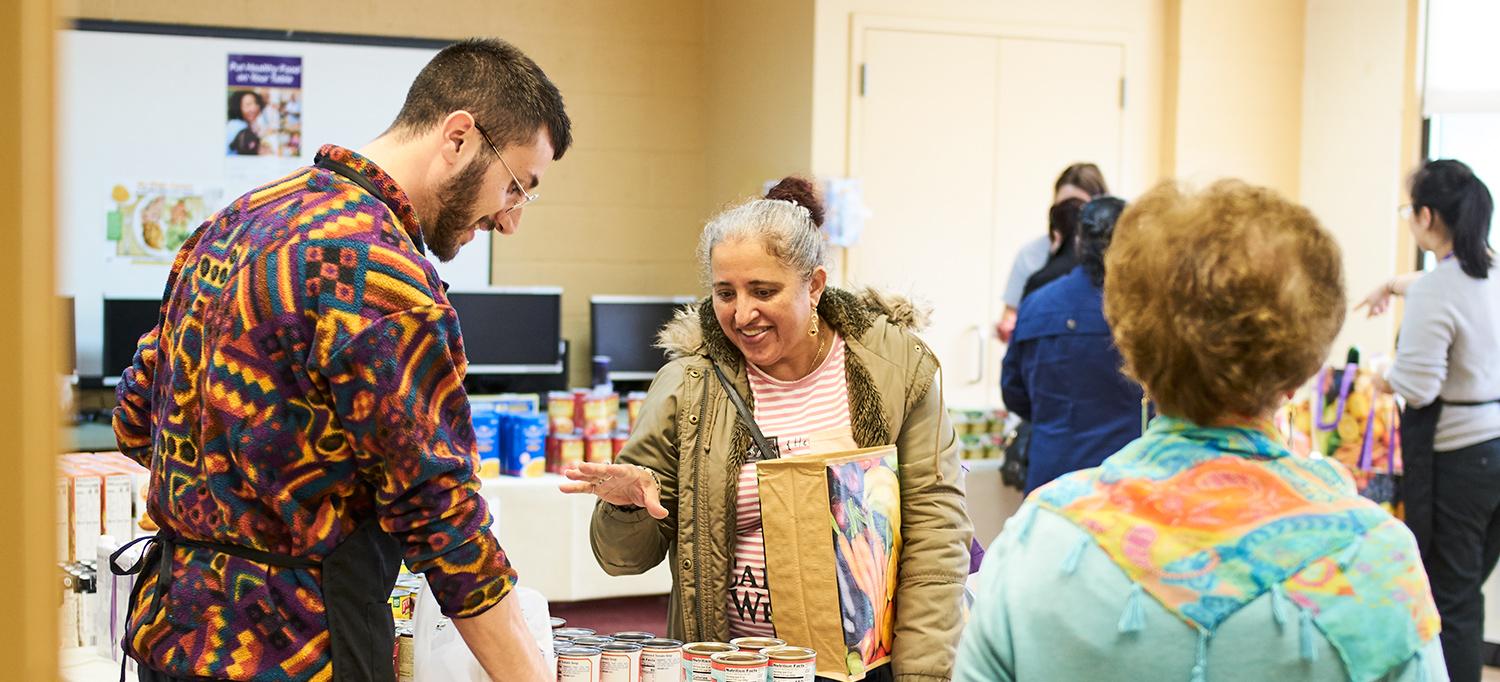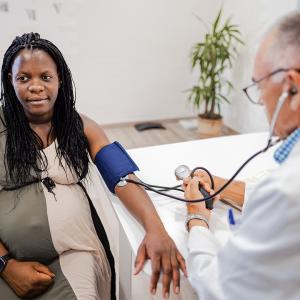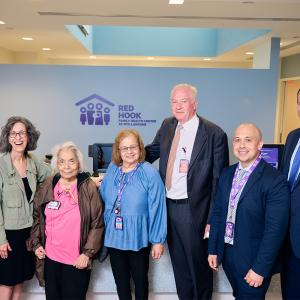New Grocery Store–Like Food Pantry in Sunset Park Provides Fresh Produce & Healthy Cooking Demonstrations

Volunteers at the Family Health Centers at NYU Langone’s new food initiative, The Table, have already served more than 1,000 people from more than 200 households since opening April 5, 2019.
Photo: James Yarusinsky
Limited access to nutritious food poses a significant health risk to the residents of Sunset Park, Brooklyn. To address emergency food needs, the Family Health Centers at NYU Langone has developed a comprehensive program to provide a new nutritional resource—with the goal of improving the community’s overall health.
The Family Health Centers at NYU Langone recently debuted a new grocery store-like food pantry, called “The Table,” complete with space for interactive healthy cooking demonstrations. It is located at the Family Support Center, at 6025 Sixth Avenue, in Sunset Park.
Open every Friday from 10:00AM to 2:00PM, and operated by NYU Langone Health volunteers and other members of the community, residents select fresh produce and other food items—like they would at a store—and learn how to prepare fresh produce available that day. This model of a “client choice” pantry has been found to improve food security, self-sufficiency, and quality diet outcomes. Funding for the pantry is provided by City Harvest, United Way of New York City, the New York City Human Resources Administration, the New York State Department of Health’s Hunger Prevention and Nutrition Assistance Program, and Driscoll Food, and expects to serve more than 300 individuals each month.
The project is the result of an innovative social determinants of health screening program developed by the Family Health Centers at NYU Langone. One of the key target populations is pregnant women, who list food insecurity among their top concerns. Food insecurity affects one out of eight people in the United States, and is especially prevalent in impoverished communities where there is limited access.
“Many physicians are aware of the role socioeconomic factors play in diseases like obesity and diabetes, but without a viable solution, physicians and health care providers don’t typically screen for food insecurity,” says Isaac P. Dapkins, MD, chief medical officer of the Family Health Centers at NYU Langone, one of the nation’s largest federally qualified health centers.
Pregnant women and young families were targeted at the outset because poor children have increased infant mortality, low birth weight with subsequent health and developmental problems, increased frequency and severity of chronic diseases, poorer nutrition and growth, and increased obesity—all of which can negatively impact one’s life trajectory and perpetuate intergenerational poverty.
“We were surprised to learn from our screening survey that one in three families in our community ran out of food at some point in the past year,” says Kathy Hopkins, vice president of Community-Based Programs—Family Health Centers at NYU Langone. “Addressing and documenting food insecurity and other social determinants of health within the context of the clinical care environment has the potential to improve patient and population health, as well as decrease healthcare costs.”
The screening program has been integrated into the intake process at six locations so far, primarily health centers where pregnant women and families with children under 5 years old are seen, as well as at community-based programs. Eventually, screening will be implemented at additional Family Health Centers at NYU Langone locations, including all 40 school-based health centers.
Additional support recently came through an $800,000 grant, over 4 years, from Single Stop USA, in collaboration with the Robin Hood Foundation. The grant supports the screening of patients for eligibility in the Supplemental Nutrition Assistance Program, or SNAP, the federal food stamp program.
Those identified as food insecure apply for federal assistance while they are on-site for their clinical appointments with the help of a patient navigator, who is a trusted member of the community. Patient navigators also provide support throughout the application review process, should any issues arise.
To date, more than 460 people have been screened, 210 federal SNAP applications have been submitted, and more than 100 families have already been approved.
While candidates await a response to their federal food assistance applications, the Family Health Centers at NYU Langone can provide emergency food vouchers for use at grocery stores, and now offer access to the new food pantry.
“We hope that by providing the community with resources and tools to prepare healthful meals, we can help address food issues before health outcomes deteriorate,” says Hopkins.
To make an appointment at The Table, please call 718-630-7186.
Media Inquiries
Deborah “DJ” Haffeman
Phone: 212-404-3567
deborah.haffeman@nyulangone.org

